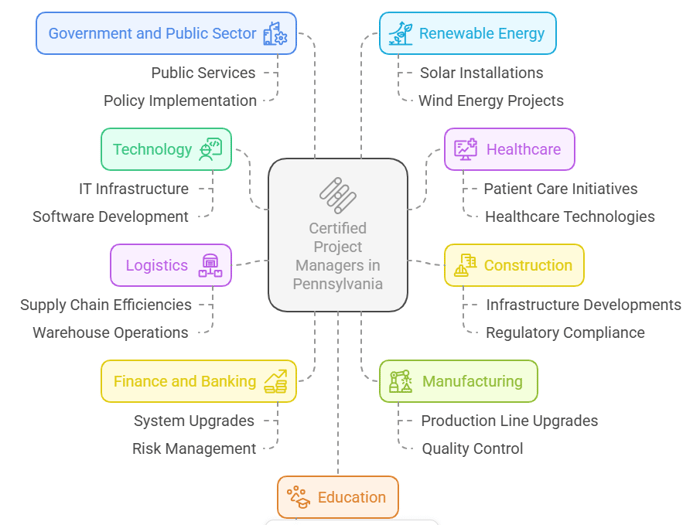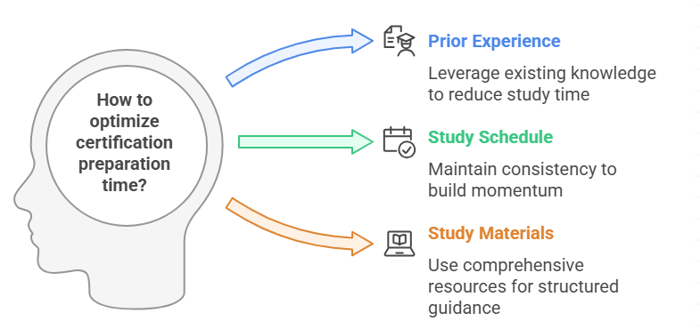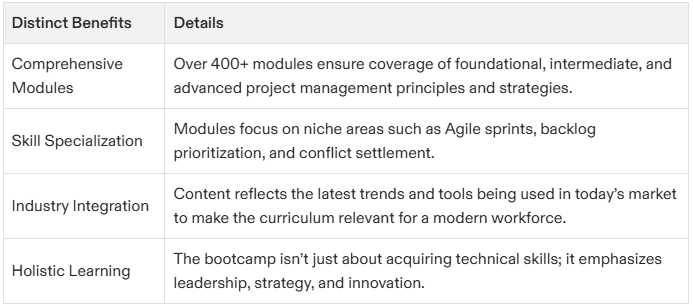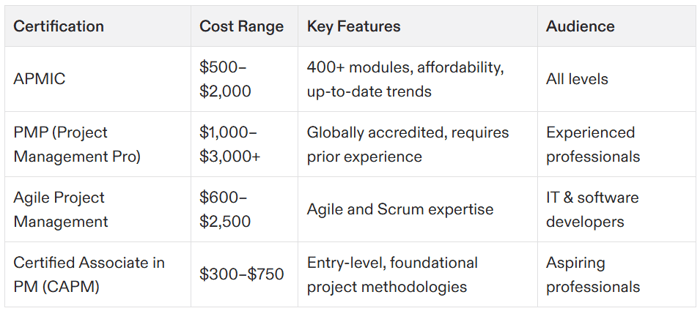Table of Contents
- Why Pursue Project Management Certification at Penn State?
- Benefits of Project Management Certification Penn State
- What Industries in Pennsylvania Need Certified Project Managers?
- How Long Does It Take to Get Certified?
- CAPM Certification Timeline
- PMP Certification Timeline
- Factors Influencing Certification Time
- Less Commonly Known Facts About Project Management Certification Penn State
- Conclusion
- People Also Ask
- FAQs
Imagine you're a superhero, but instead of superpowers, you wield project management skills. You can save the day by delivering projects on time, under budget, and with a smile. Welcome to the world of Project Management Certification at Penn State University, where you can become that superhero. Penn State offers a comprehensive program that equips you with the tools to manage complex projects across various industries. Let's dive into what makes this certification so powerful.

Why Pursue Project Management Certification at Penn State?
Earning a Project Management Certification from Penn State is a strategic move for professionals looking to enhance their leadership skills and marketability in competitive job markets. This certification is particularly beneficial for both emerging managers and seasoned professionals, providing access to high-quality educational resources and a comprehensive curriculum.
World-Class Reputation
Penn State is renowned for offering high-quality educational programs recognized globally. By pursuing your certification through their platforms, you benefit from a program steeped in industry credibility and academic excellence. This reputation translates into increased credibility and recognition among employers, making you a more attractive candidate in the job market.
Comprehensive Curriculum
Penn State’s project management courses align with globally recognized frameworks such as Agile, Scrum, and Waterfall. This ensures your certification addresses real-world industry needs, making you a more effective project manager. For instance, students can gain hands-on expertise in managing multifaceted projects, from tech implementations to healthcare system upgrades, while developing leadership and stakeholder communication skills.
Career Opportunities Across Industries
Penn State alumni equipped with project management certifications thrive in sectors such as technology, construction, healthcare, and finance. These industries highly value project managers who can optimize resources and deliver results under tight deadlines, making certified professionals indispensable.
Benefits of Project Management Certification Penn State
Build Leadership Excellence
Certification programs through Penn State are designed to unlock your full leadership potential. By developing critical skills such as decision-making, risk management, and quality control, you’ll gain the confidence and tools to lead diverse and collaborative teams effectively. These capabilities empower you to not only manage projects but also inspire innovation within your organization.
Take, for example, a certified project manager working in Pennsylvania’s growing renewable energy sector. Leading the design and deployment of a solar panel installation project requires juggling timelines, mitigating environmental risks, and ensuring compliance with regulatory standards—all while keeping stakeholders aligned. A Project Management Certification Penn State equips you with globally recognized frameworks like Agile, which helps in adapting to shifting project needs with precision. This level of expertise positions you as a go-to leader for high-impact initiatives.
Enhance Your Marketability
Earning a Project Management Certification Penn State doesn’t just verify your qualifications; it demonstrates your ability to take projects from concept to completion with efficiency and professionalism. Employers value certifications as proof of your commitment to maintaining high standards in your work and staying competitive in your field.
Certified project managers often experience accelerated career growth, landing prominent roles in industries such as healthcare, technology, or logistics. For instance, a project manager at a healthcare organization may use their certification to streamline the rollout of a new electronic health records system. With strong methodologies learned through Penn State’s programs, they can manage resources, adhere to budgets, and ensure timely delivery. This level of proficiency not only puts you ahead of other candidates during hiring processes but also makes you a strong contender for promotions and opportunities to manage larger, more complex projects.
Unlock Exclusive Resources with APMIC
The path to certification success depends on having access to the right tools—and that’s where APMIC’s resources come into play. Designed to turn theory into practice, these resources provide comprehensive, practical support for even the most demanding certification exams.

Interactive Quizzes: Strengthen your understanding of Agile workflows or risk mitigation strategies by applying what you’ve learned in dynamic practice sessions.
Video Tutorials: These mobile-friendly tutorials give you the flexibility to learn on your schedule. Whether commuting or relaxing at home, you can stay on track.
Case Studies: Gain hands-on experience by solving real-world project scenarios, such as creating a stakeholder engagement plan for a multi-million-dollar tech implementation.
For aspiring professionals dedicated to earning certifications like CAPM or PMP, APMIC’s tailored resources ensure you can study efficiently without sacrificing work-life balance. Each module is designed to walk you through industry-specific challenges, so you can face them with confidence in real-world projects.

What Industries in Pennsylvania Need Certified Project Managers?
Pennsylvania is a diverse state with a wide range of industries that require skilled project managers. Here are some key sectors where certified project managers are in high demand:
Technology
The technology sector in Pennsylvania is thriving, with major hubs in cities like Philadelphia and Pittsburgh. Certified project managers are needed to manage IT infrastructure overhauls, oversee software development, and lead product launches. Their expertise ensures that projects are completed on time, within budget, and meet the required quality standards.Healthcare
The healthcare industry is another significant sector in Pennsylvania, with numerous hospitals and medical research centers. Certified project managers play a crucial role in leading initiatives for patient care improvements, system optimizations, and the implementation of new healthcare technologies. Their skills are essential for managing complex projects that involve multiple stakeholders and tight deadlines.Construction
Pennsylvania is home to numerous construction projects, including major infrastructure developments such as roadways, bridges, and buildings. Certified project managers are vital in overseeing these projects, ensuring they are completed safely, on schedule, and within budget. Their expertise helps manage risks, coordinate with contractors, and maintain compliance with regulatory requirements.Logistics
With the rise of e-commerce, Pennsylvania's logistics sector is experiencing rapid growth. Certified project managers are needed to manage supply chain efficiencies, ensuring that goods are delivered promptly and cost-effectively. Their skills in managing complex supply chains, optimizing routes, and improving warehouse operations are invaluable in this fast-paced industry.Finance and Banking
The financial sector in Pennsylvania, particularly in Philadelphia, requires certified project managers to oversee financial system upgrades, compliance projects, and risk management initiatives. Their expertise helps ensure that financial institutions operate efficiently and securely.Manufacturing
Pennsylvania has a strong manufacturing base, with industries ranging from automotive to pharmaceuticals. Certified project managers are essential for managing production line upgrades, quality control initiatives, and supply chain optimizations. Their skills help maintain production efficiency and ensure compliance with industry standards.Government and Public Sector
The government sector in Pennsylvania involves numerous projects related to public services, infrastructure, and policy implementation. Certified project managers are needed to manage these projects effectively, ensuring they meet public needs while adhering to budget constraints and regulatory requirements.Renewable Energy
As Pennsylvania continues to invest in renewable energy, certified project managers are required to lead projects related to solar and wind energy installations. Their expertise is crucial for managing environmental risks, ensuring compliance with regulations, and coordinating with stakeholders.Education
The education sector in Pennsylvania also benefits from certified project managers, who can oversee initiatives such as campus expansions, technology upgrades, and curriculum development projects. Their skills help manage budgets, timelines, and stakeholder expectations.Biotechnology and Pharmaceuticals
Pennsylvania is home to a thriving biotech and pharmaceutical industry, with companies involved in drug development and medical research. Certified project managers are needed to manage research projects, clinical trials, and product launches, ensuring that these complex processes are executed efficiently and effectively.
These industries highlight the diverse opportunities available for certified project managers in Pennsylvania, demonstrating the versatility and demand for this skillset across various sectors.
How Long Does It Take to Get Certified?
The time it takes to become certified in project management depends on the specific certification program you choose. Here's a breakdown of the typical timelines for two popular certifications: CAPM (Certified Associate in Project Management) and PMP (Project Management Professional).
CAPM Certification Timeline
Duration: Typically takes around 2–3 months.
Preparation: This timeline includes studying for the exam, which covers basic project management concepts and terminology.
Eligibility: To be eligible for the CAPM exam, you need a secondary degree (high school diploma, associate’s degree, or equivalent) and at least 23 hours of project management education.
Study Effort: The CAPM exam requires less study time compared to the PMP, as it focuses on foundational knowledge rather than advanced skills.
For more details on whether Project Management Certification is worth it, you can read this guide on the value of certification.
PMP Certification Timeline
Duration: Generally requires 4–6 months of dedicated study and preparation.
Preparation: This timeline includes extensive study of project management processes, practices, and techniques. The PMP exam is more comprehensive and requires a deeper understanding of project management principles.
Eligibility: To be eligible for the PMP exam, you need either:
A four-year degree (bachelor’s degree or equivalent) and at least 35 hours of project management education, along with 4,500 hours of project management experience.
A secondary degree (high school diploma, associate’s degree, or equivalent) and at least 35 hours of project management education, along with 7,500 hours of project management experience.
Study Effort: The PMP exam requires more study time due to its complexity and the need to demonstrate practical experience in project management.

Factors Influencing Certification Time
Prior Experience: Individuals with prior project management experience may find it easier to prepare for these exams, potentially reducing study time.
Study Schedule: Consistency in studying is crucial. Setting aside dedicated time each week can help maintain momentum and reduce overall preparation time.
Study Materials: Access to comprehensive study materials, such as textbooks, online courses, and practice exams, can significantly impact preparation time. Resources like APMIC’s study tools can provide structured guidance and support.
Less Commonly Known Facts About Project Management Certification Penn State
Penn State is a PMI Authorized Training Partner: "Penn State’s programs are recognized and endorsed by the Project Management Institute, ensuring that the curriculum meets industry standards" – PMI Authorized Training Partners - Wikipedia
Flexible Learning Options: "Penn State offers both online and offline courses, providing flexibility for students with different learning preferences" – Online Learning - Wikipedia
Industry-Relevant Curriculum: "The curriculum is designed to address real-world challenges, ensuring that graduates are equipped to handle complex projects across various sectors" – Project Management - Wikipedia
Global Recognition: "Penn State’s certification is recognized globally, making it a valuable asset for professionals aiming to work internationally" – Global Recognition of Certifications - Wikipedia
Career Support: "Penn State provides career support services to help graduates transition into new roles or advance in their current careers" – Career Services - Wikipedia
Continuing Education Units (CEUs): "Many programs offer CEUs, which are valuable for ongoing professional development" – Continuing Education - Wikipedia
Digital Badges: "Some programs award digital badges upon completion, which can be displayed on professional profiles to showcase skills" – Digital Badges - Wikipedia
Conclusion
In conclusion, pursuing a Project Management Certification from Penn State University is a strategic career move that can elevate your professional standing and open doors to new opportunities. With its comprehensive curriculum, global recognition, and flexible learning options, Penn State’s program is ideal for anyone looking to excel in project management. If you're aiming to become a certified project management professional, consider leveraging the best resources available. For those preparing for the PMP exam, check out the top-notch PMP Certification Prep Course offered by APMIC. This course provides the tools and support needed to succeed in your certification journey.
People Also Ask
Q: What is the significance of earning PDUs in the Project Management Certification program?
A: Earning Professional Development Units (PDUs) is crucial for maintaining certifications like PMP. Penn State’s programs provide PDUs that can be applied towards achieving or maintaining these credentials.
Q: How does Penn State’s Project Management Certification prepare students for real-world challenges?
A: The program focuses on practical application of project management principles through case studies and hands-on exercises, ensuring students are well-prepared for real-world challenges.
Q: Can I use the certification to transition into a different industry?
A: Yes, the certification is versatile and can be applied across various industries, making it an excellent tool for career transition.
Q: What support does APMIC offer for certification preparation?
A: APMIC provides comprehensive study materials, including interactive quizzes, video tutorials, and real-world case studies, to help prepare for certification exams.
Q: How does Penn State’s certification impact career advancement?
A: The certification significantly enhances career prospects by demonstrating expertise and commitment to project management best practices.
Q: Are there any prerequisites for enrolling in Penn State’s Project Management Certification program?
A: Generally, there are no prerequisites for enrolling in the non-credit certificate programs, but courses must be taken in sequence.
Q: Can I earn a graduate degree in project management from Penn State?
A: Yes, Penn State offers a graduate certificate in project management through Penn State World Campus, which is a 12-credit online program.
Q: How does Penn State’s certification compare to other project management certifications?
A: Penn State’s certification is highly regarded due to its alignment with global standards and its focus on practical application, making it competitive with other certifications like PMP.
FAQs
What is the significance of earning PDUs in the Project Management Certification program?
Earning Professional Development Units (PDUs) is crucial for maintaining certifications like PMP. Penn State’s programs provide PDUs that can be applied towards achieving or maintaining these credentials.
How does Penn State’s Project Management Certification prepare students for real-world challenges?
The program focuses on practical application of project management principles through case studies and hands-on exercises, ensuring students are well-prepared for real-world challenges.
Can I use the certification to transition into a different industry?
Yes, the certification is versatile and can be applied across various industries, making it an excellent tool for career transition.
What support does APMIC offer for certification preparation?
APMIC provides comprehensive study materials, including interactive quizzes, video tutorials, and real-world case studies, to help prepare for certification exams.
How does Penn State’s certification impact career advancement?
The certification significantly enhances career prospects by demonstrating expertise and commitment to project management best practices.
Are there any prerequisites for enrolling in Penn State’s Project Management Certification program?
Generally, there are no prerequisites for enrolling in the non-credit certificate programs, but courses must be taken in sequence.
Can I earn a graduate degree in project management from Penn State?
Yes, Penn State offers a graduate certificate in project management through Penn State World Campus, which is a 12-credit online program.





